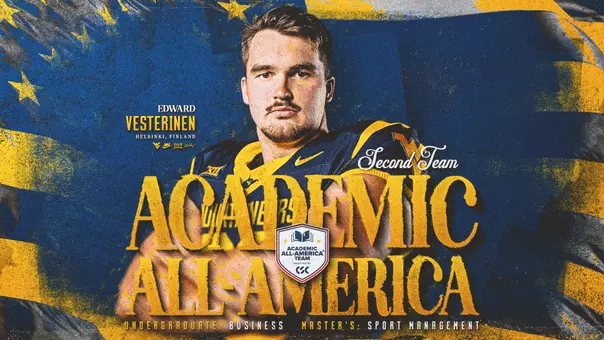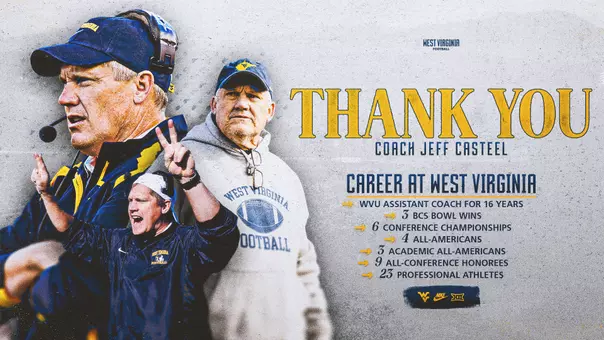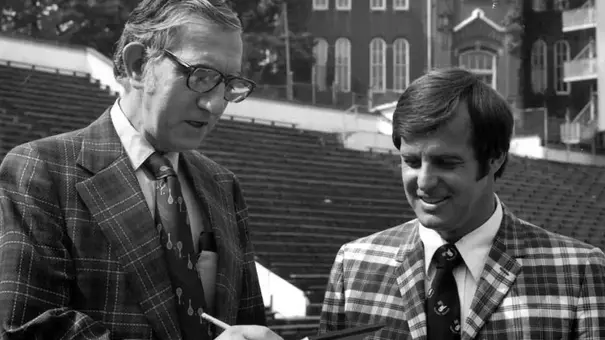Photo by: WVU Athletic Communications
Rodriguez Working to Bring Championship Mentality Back to Mountaineers
March 27, 2025 03:30 PM | Football
MORGANTOWN, W.Va. – Coaches will always tell you how difficult it is to win games, no matter the sport.
The team you are facing wants to win just as badly as you do, which always makes winning so tough. Winning frequently becomes exponentially more difficult, and, of course, winning a championship is the hardest thing of all to do.
Since West Virginia joined the Big 12 Conference in 2012, we've sat in the team meeting room and listened to player after player sit at the dais and talk about their desire to win a championship.
They talk about it when they are lifting weights in the wintertime or when they are running Law School Hill on a hot day in the summertime.
But talking about it and doing it are two entirely different things, which is what Rich Rodriguez is trying to get across to the current roster of Mountaineer players he's inherited. It begins with having a competitive mindset every single day in practice and not settling for less than your absolute best.
Sometimes that means having to perform when you are not always feeling your best. Earlier this week, Rodriguez talked about toughness and durability being talents just like speed, quickness and athleticism.
"When you are talking about reps in practice, I'm talking about going against another guy in a different color jersey; I'm not used to being non-competitive in those reps, whether you are live or thud," Rodriguez said following Thursday's practice. "One-on-ones, whatever it is, I'm not saying it's the end of the world if you lose a rep, but it ought to bother you a little bit. It ought to bother you as a coach. It bothers the hell out of me. It bothers me until the next practice."
Rodriguez firmly believes having a football team full of players who can't stand to lose practice reps will carry over into the games when those reps really count.
"There are a lot of things we've got to work on and a lot of things we've got to get better at, but the thing that's non-negotiable is playing hard and playing tough. You cannot be soft and lazy," he explained.
"I don't want one person to buy a season ticket to a Mountaineer game and sit in those stands and watch somebody be soft or somebody be lazy. Not one fan; because they can see that if they're doing that," he continued.
"So, if there is one guy on our team that is soft or one guy on our team that is lazy, he's got to change that, or he can't play for the Mountaineers. Their version of it, and even the staff's version of it and mine aren't exactly the same all the time."
Junior wide receiver Rodney Gallagher III admits he's already developing a different idea of the meaning of hard work.
He chose his words carefully when explaining.
"I think I do have a different … how can I say this? I think with me looking at it, Rich Rod has taught me a lot about having confidence and looking toward the future of how to be a better player," he said. "With him being honest every single day, and striving to be a better team, I think that's (given) me a different outlook, and I just appreciate him for that."
Gallagher, a wide receiver who has played two years of Big 12 football and has faced highly successful programs, borrowed some of Rodriguez's terminology and phrasing this afternoon to describe what it takes to be a championship-level team.
It's something that has been elusive to Mountaineer football since 2011, four years after Rodriguez left. Coach Dana Holgorsen's roster was either made up of the remnants of Rodriguez-recruited players or players who came to WVU because of the success of Rodriguez's teams.
The mindset and the culture of the program that was established under Rich Rodriguez continued with Bill Stewart, and it was Holgorsen who inherited those players and that winning mindset to claim Mountaineer football's last conference title 14 years ago in 2011.
Today, Rodriguez is in the process of reestablishing that winning culture.
"I think it's the hard-edge and having the mindset of us wanting to be great and knowing that we can compete with anybody in the country," Gallagher admitted, using the phrase "hard-edge" that Rodriguez loves to repeat. "We need to go out there with confidence and play our hardest. It's all about effort also. If we have more effort, and we're locked in mentally in everything that we need to do, I think we're going to be super-special in the Big 12."
Pat Kirkland, around here as a graduate assistant coach when West Virginia won the Big East in 2007 and then the Fiesta Bowl against Oklahoma, has adopted Rodriguez's attitude toward winning.
Among his many responsibilities is overseeing the Mountaineer special teams. Some coaches desire having their units rank among the best in the conference or the country in their specific areas - one, because it brings attention to themselves and, two, because it can be rewarding to them financially and professionally.
Yet, Kirkland had a telling response today when talking about West Virginia's special teams.
"Our No. 1 goal is not to lead the Big 12 in return yards or number of blocked kicks; we want to lead the Big 12 in wins," he explained. "Whatever we've got to do to put our players in the best position to be successful in the kicking game is what we're going to do."
Winning is the ultimate in team sports.
And it's not easy to do, something Rodriguez is trying to get everyone involved in the Mountaineer program to understand.
The team you are facing wants to win just as badly as you do, which always makes winning so tough. Winning frequently becomes exponentially more difficult, and, of course, winning a championship is the hardest thing of all to do.
Since West Virginia joined the Big 12 Conference in 2012, we've sat in the team meeting room and listened to player after player sit at the dais and talk about their desire to win a championship.
They talk about it when they are lifting weights in the wintertime or when they are running Law School Hill on a hot day in the summertime.
But talking about it and doing it are two entirely different things, which is what Rich Rodriguez is trying to get across to the current roster of Mountaineer players he's inherited. It begins with having a competitive mindset every single day in practice and not settling for less than your absolute best.
Sometimes that means having to perform when you are not always feeling your best. Earlier this week, Rodriguez talked about toughness and durability being talents just like speed, quickness and athleticism.
"When you are talking about reps in practice, I'm talking about going against another guy in a different color jersey; I'm not used to being non-competitive in those reps, whether you are live or thud," Rodriguez said following Thursday's practice. "One-on-ones, whatever it is, I'm not saying it's the end of the world if you lose a rep, but it ought to bother you a little bit. It ought to bother you as a coach. It bothers the hell out of me. It bothers me until the next practice."
Rodriguez firmly believes having a football team full of players who can't stand to lose practice reps will carry over into the games when those reps really count.
"There are a lot of things we've got to work on and a lot of things we've got to get better at, but the thing that's non-negotiable is playing hard and playing tough. You cannot be soft and lazy," he explained.
"I don't want one person to buy a season ticket to a Mountaineer game and sit in those stands and watch somebody be soft or somebody be lazy. Not one fan; because they can see that if they're doing that," he continued.
"So, if there is one guy on our team that is soft or one guy on our team that is lazy, he's got to change that, or he can't play for the Mountaineers. Their version of it, and even the staff's version of it and mine aren't exactly the same all the time."
Junior wide receiver Rodney Gallagher III admits he's already developing a different idea of the meaning of hard work.
He chose his words carefully when explaining.
"I think I do have a different … how can I say this? I think with me looking at it, Rich Rod has taught me a lot about having confidence and looking toward the future of how to be a better player," he said. "With him being honest every single day, and striving to be a better team, I think that's (given) me a different outlook, and I just appreciate him for that."
Gallagher, a wide receiver who has played two years of Big 12 football and has faced highly successful programs, borrowed some of Rodriguez's terminology and phrasing this afternoon to describe what it takes to be a championship-level team.
It's something that has been elusive to Mountaineer football since 2011, four years after Rodriguez left. Coach Dana Holgorsen's roster was either made up of the remnants of Rodriguez-recruited players or players who came to WVU because of the success of Rodriguez's teams.
The mindset and the culture of the program that was established under Rich Rodriguez continued with Bill Stewart, and it was Holgorsen who inherited those players and that winning mindset to claim Mountaineer football's last conference title 14 years ago in 2011.
Today, Rodriguez is in the process of reestablishing that winning culture.
"I think it's the hard-edge and having the mindset of us wanting to be great and knowing that we can compete with anybody in the country," Gallagher admitted, using the phrase "hard-edge" that Rodriguez loves to repeat. "We need to go out there with confidence and play our hardest. It's all about effort also. If we have more effort, and we're locked in mentally in everything that we need to do, I think we're going to be super-special in the Big 12."
Pat Kirkland, around here as a graduate assistant coach when West Virginia won the Big East in 2007 and then the Fiesta Bowl against Oklahoma, has adopted Rodriguez's attitude toward winning.
Among his many responsibilities is overseeing the Mountaineer special teams. Some coaches desire having their units rank among the best in the conference or the country in their specific areas - one, because it brings attention to themselves and, two, because it can be rewarding to them financially and professionally.
Yet, Kirkland had a telling response today when talking about West Virginia's special teams.
"Our No. 1 goal is not to lead the Big 12 in return yards or number of blocked kicks; we want to lead the Big 12 in wins," he explained. "Whatever we've got to do to put our players in the best position to be successful in the kicking game is what we're going to do."
Winning is the ultimate in team sports.
And it's not easy to do, something Rodriguez is trying to get everyone involved in the Mountaineer program to understand.
Players Mentioned
Rich Rodriguez | Dec. 3
Wednesday, December 03
Reid Carrico | Nov. 29
Saturday, November 29
Jeff Weimer | Nov. 29
Saturday, November 29
Rich Rodriguez | Nov. 29
Saturday, November 29
















